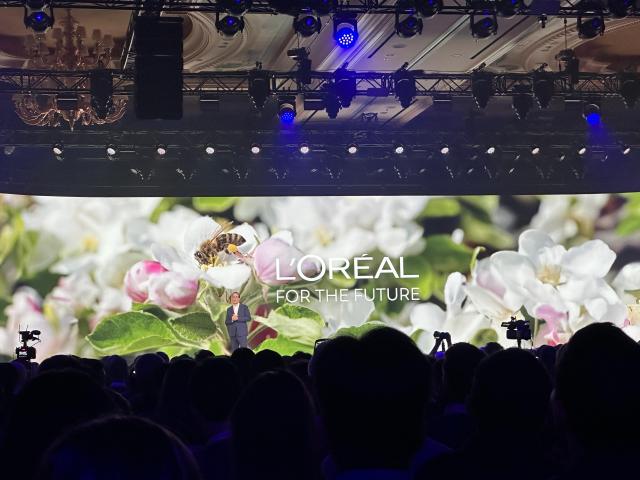
LAS VEGAS -- Not truly knowing their actual skin tone or type, hundreds of thousands of consumers live their everyday lives constantly wondering whether they are using the right cosmetic products. To help customers solve their dilemmas, L'Oréal, one of the world's largest beauty product makers, has introduced an artificial intelligence-based service that can curate cosmetic products that best suit customers' skin tones and conditions.
"Beauty Genius," the AI-based solution revealed at the Consumer Electronics Show (CES), an iconic annual electronics exhibition held in Las Vegas, on January 10 (local time) was designed to assist customers who find it hard to choose the right cosmetics from countless beauty products. According to cosmetics giant L'Oréal, about 50 percent of female consumers cannot find the right products that complement their unique skin tones and conditions.
The world's leading beauty manufacturer stepped into the world of digital technologies, including augmented reality (AR), virtual reality (VR), and AI, in 2018 through an acquisition of ModiFace, a Canada-based AR developer company that developed solutions enabling users to virtually try on different styles of hair, colors of nail, and make-up in a virtual space.
During a media conference event, L'Oréal unveiled Beauty Genius, introducing the solution as an AI assistant that had learned 10 petabytes of beauty-related data. Addressing about 70 percent of L'Oréal's customers who find the product that best suits them because of massive lineups of cosmetics, L'Oréal Groupe CEO Nicolas Hieronimus said that the Beauty Genius solution would help customers find the best-matching cosmetics without the assistance of friends and cosmetics salespeople.
The smart cosmetics assistant can verbally interact with customers to engage in conversations. When a customer tells the AI assistant that she just arrived in Las Vegas on an 11-hour flight, Beauty Genius would say that it is vital to express strength and pride on important occasions and suggest matching products and video clips on how to use them.
Meanwhile, Samsung SDS, the digital solution wing of South Korea's Samsung conglomerate, also introduced a large language model (LLM)-based generative AI solutions at CES 2024. The company unveiled "FabriX," a generative AI service platform, and "Brity Copilot," a cooperative AI solution, to help Samsung SDS employees increase work efficiency and reduce operating costs.
Generative AI solutions, mostly recognized by American tech company Open AI's iconic AI-based service "Chat GPT," global web service giant Google's "Bard," and American tech giant Microsoft's "Copilot" generate content or search for information to meet users' demands. However, because such generative AI services are based on machine-learned data obtained from the web, it is possible for the robots to learn from users' demands and questions, leading to leaking accidents of information that is vital for companies.
Samsung SDS' FabriX and Brity Copilot were developed to prevent information breaches and to ensure a safe environment where workers use the full potential of generative AI services. According to the solution maker, its generative AI solutions show about 94 percent accuracy in understanding the Korean language while they show similar levels of accuracy when interacting with users in English. Other generative AI solutions such as Chat GPT have an accuracy rate of about 95 percent.
The South Korean solution maker said that Brity Copilot can be used for creating meeting logs during a video conference, creating action plans after meetings and sending the plans to related employees and executives, summarizing messenger app conversations, and creating emails related to work.
Copyright ⓒ Aju Press All rights reserved.



![[CES 2026] Tactile technology seeks to preserve Japans endangered craft skills](https://image.ajunews.com/content/image/2026/01/09/20260109081719899487_278_163.jpg)
![[CES 2026] Seoul startups vie for attention at CES, powered by student talent](https://image.ajunews.com/content/image/2026/01/08/20260108153955802448_278_163.jpg)